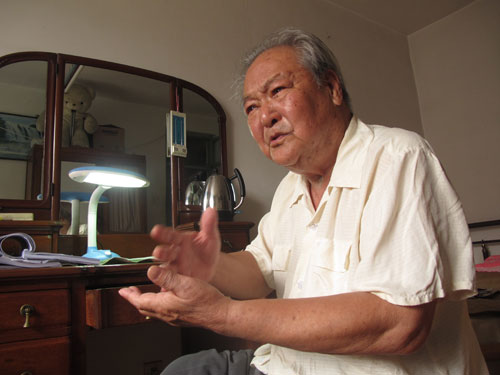
 |
|
Yu Wenji says his memory of Eric Liddell hasn't faded even as he ages. Wang Kaihao / China Daily |
The story of Eric Liddell is celebrated in the film Chariots of Fire and in a new book on the athlete by a resident of Tianjin who knew him well. Wang Kaihao reports in Tianjin.
Yu Wenji, 86, is half-blind. But when he heard the theme music from the 1981 British movie Chariots of Fire, in which Eric Liddell is one of the two athlete protagonists, during the Opening Ceremony of the London Olympic Games on TV, the Tianjin resident says he almost burst into tears.
|
Related readings: |
"I watched the movie three times in row when I first got the videotape," he says. "He (Liddell) always leans back his head when crossing the finishing line. That scene is still vivid in my mind."
Yu spent 15 years writing a biography of Liddell, which was published in 2009. He has finished a revised version of the book, which he hopes will be published this year as a celebration of Liddell's 110th birthday.
Liddell, gold medallist in the men's 400m at the 1924 Paris Olympic Games, was born to a Scottish missionary family in Tianjin in 1902, and left China at the age of 5. He returned to his birthplace in 1925, when he began to teach at the Tientsin (old spelling of Tianjin) Anglo-Chinese College (TACC) serving the London Missionary Society. His Chinese name is Li Airui.
TACC was built in 1902 as a college. It was one of the first schools established by foreign missionaries in Tianjin, and was changed into a high school in 1930.
In 1938, the 12-year-old Yu was at elementary school, loved singing and occasionally went to a church nearby to join the choir.
"Liddell played tennis on the weekends. I was the last one to leave the church one day and he stopped me to ask if I wanted to be his ball boy."
Yu took the job, and helped Liddell for one year. Liddell often chatted with him when taking a rest by the tennis court.
"He told me people were born on the same starting line, but the results were different, so people needed talent and high expectations for the future so as not to let down the healthy body given by God."
Yu says this amiable former champion gave him several English textbooks and encouraged him to study hard, inspiring him to pass the difficult TACC entrance exam. Fourteen people from three generations of Yu's family studied there. The big and wealthy family then ran a store selling foreign products.
He says Liddell would practice running around school in the morning and sometimes at Minyuan Stadium in the British concession.
Liddell helped design this stadium and based it on the blueprint of Stamford Bridge, Chelsea Football Club's home ground, shortly after he returned to China. He still sporadically competed after being a teacher at TACC.
Minyuan is where he took part in his last formal competition and won his last gold medal, in 1929. He also trained Chinese athlete Wu Bixian, a high jumper who later participated in the 1936 Berlin Olympic Games.
Liddell busily shuttled between TACC and the countryside in Xiaozhang, Hebei province, as he also held a position there at a church hospital. Yu regrets that Liddell was never his teacher, though he did occasionally substitute for absent teachers.
"I still remember the first English class he taught us. It was about how to tell time in English," Yu switches from his Tianjin dialect to a British accent English recalling the content in that class.
"His English was simple but very humorous," Yu says. "But he was very serious when protecting students' rights. He once quarreled with the headmaster to ask for more subsidies for students not from wealthy families."